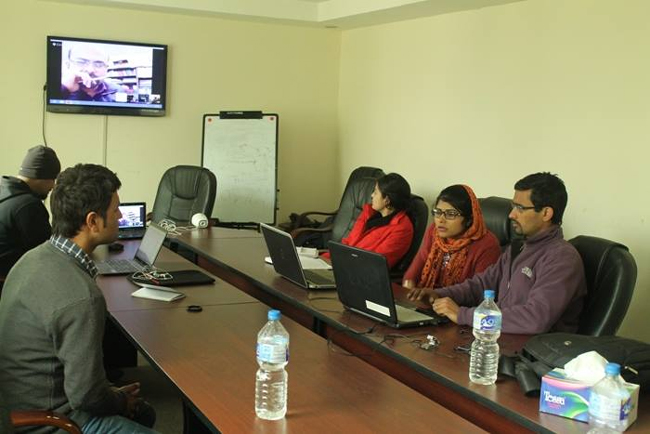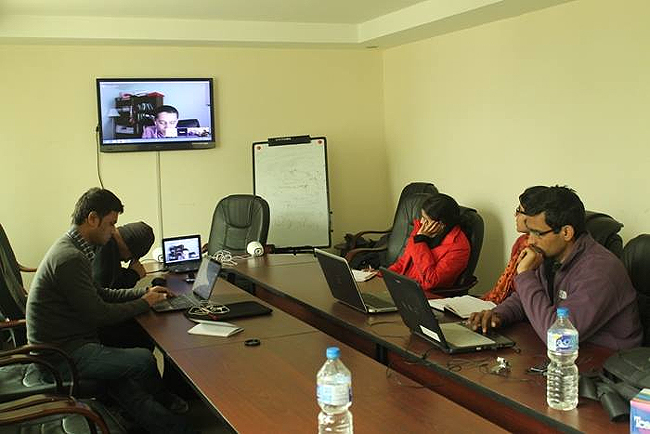Shyam Sharma and Uttam Gaulee
Outside, the pile of snow was thicker than vehicles parked on the street. From frozen New York joined Shyam Sharma.
Uttam Gaulee was in warm Florida (as far away from Shyam’s place as Colombo is from Kathmandu), at 10.30pm, still in my University of Florida office.
In Kathmandu’s King’s College in Babarmahal had gathered some of Nepal’s brightest ELT scholars– which we are not exaggerating. It was early morning there, seemingly cold, and some colleagues were slightly late from trying to juggle personal and professional responsibilities (as well as beat Kathmandu’s traffic).
Present in the virtual shade of the Choutari tree were Praveen Yadav, Umes Shrestha, UshakiranWagle, Santona Neupane, Suman Laudari, and Jeevan Karki from Nepal; Uttam and Shyam joined from the US.
Technological Demo
This was a meeting among Choutari editors, originally supposed to be a “training” where Shyam was going to walk us through the kinks of technology before discussing how to translate technological affordances into professional purposes. The plan was to ensure that editors are proficient in the use of WordPress blog platform and functionalities: how to add new posts, save drafts, schedule for certain dates, order by time stamps, create table of content, hyperlink using part of preview link, integrate images and other media, learn how to tag and categorize posts, and so on. Shyam did start by emphasizing that the technology is largely a tool that we need to learn how to use with command (meaning everyone must learn how to post/schedule, edit, link, organize, and manage posts and pages on the blog) but the focus must be on how to achieve the professional objectives that the tools are used for achieving. We used the metaphor of hasiya, kodalo, and bancharo and how we keep them sharp and ready but don’t look at them as the focus of our harvest seasons.
However, within a few minutes of trying to walk the rest of the group through the dashboard of the WordPress blog, using Google Hangout’s Screen Share functionality, he realized that the participants already knew the basic applications and functions–or at least they could teach each other basic features and more quickly and easily. In fact, more people than we knew prior to the meeting turned out to have their own blogs and have mastered fairly advanced functions. Going into details of advanced functions like managing widgets, plugins, theme and customization, exporting content, and managing pages could make the meeting more boring than productive; and more advanced functions should also come from gradual development of expertise. Some roles such as approving comments can be assigned to certain editors because they need some attention and understanding (such as spotting and excluding spams; Uttam and Praveen seem to be doing this now, and that looks like a good plan).
So, the conversation naturally and quickly moved on to the agenda of maintaining quality, promoting collaboration and efficiency, and modeling for as well as engaging the community.
Maintaining Quality: Making Review Process Effective and Efficient
We started this segment by summarizing the notes that were shared with the group prior to the meeting. It is worth highlighting that editors fully familiarize themselves with the rules provided to writers; these rules are outlined and even demonstrated under the section “Join the Conversation.” We also later discussed the overarching objectives of the forum spelled out at the top of the Team Charter. The specific best practices and general mission statements are worth viewing as giving us a sense of direction with regard to quality of the publication and engagement of the community. Below is a rundown of what we discussed in terms of making the objective of maintaining quality/standard efficient from a collaborative perspective. Please don’t read these as instructions; they were discussed as suggestions for effectiveness and efficiency. Everyone agreed that a more efficient process for collaboration is needed.
- Submission: All submissions must be made to the official email, neltachoutari@gmail.com in order to avoid various types of possible confusions and inefficiencies. First, promote the “Join the Conversation” section; when any authors submit their drafts to individual editors, they should request the writer to resubmit it to the official email address (create a template email if necessary); or just forward the email to the official email, copying the author. Even this much will make a huge difference in terms of streamlining the review process.
- Reception & Assignment: The lead editor of the next month should respond to all submissions made between, say, 16th of the previous month to the 15th of the current month. Lead editors can choose to respond from the official email if they prefer; otherwise, lead editors can respond to writers of each submission during the time window and copy one reviewer (and if necessary one mentor), asking everyone to complete the review process and submit the article by, say, the 24th of the month before publication. If a lead editor can distribute the burden of review among different editors/reviewers, starting with his/her subeditor(s), this will allow the lead editor to be more creative, to try to cover more base, to run the conversation, and to better maintain the overall quality. To avoid confusion, editor/reviewers not assigned to work on any draft should leave it to the assigned editors/reviewers. We also discussed the driving principle that “collaboration” and “taking turns” are two very different things, and what we need is the first!
- Collaborative Review: Using Google Doc as a general rule can make a positive difference, though it may be necessary to give individual writers the choice of opting out and using email with his/her reviewer (and mentor if any). Lead editor can create a new Google Doc each within the official account, giving edit access to the writer (as well as editor/reviewer and any mentor). Again, while some writers may not be able to use Google Doc (due to technological limitations of skill, tools, internet, anxiety, etc), even those who are able to do so will significantly eliminate the need for email- or phone- based updates among the writer, reviewer, and coordinating editor. Just the lead editor being able to see where the review process for some of the submissions can save a lot of time and hassle. Finally, some writers may not want the review process to be open to all editors, but the solution to this is to make the review process more professional (and respectful of authors) rather than relapsing into privacy–because the idea of privacy among editors doesn’t make sense anyway. A standardized folder and file naming convention should be developed through a Facebook Group conversation.
- Assessment of Quality: Lead editors should sort submissions into three or four groups, such as: 1) ready for publication with minor edits, 2) worth reviewing and publishing next month, 3) worth assigning a mentor as well as reviewer, and 4) impossible to improve. While the general principle of a community like this should be “reform not reject,” there may be some cases of #4, such as plagiarized or already published content, not at all related to ELT, etc. Drafts in category #1 can be managed by lead editors themselves (no need to assign a reviewer); drafts in category #2 would be the majority; drafts in category #3 should be directed to the coordinator of of the Choutari Mentoring Project, Uttam Gaulee, or at least copied/coordinated. The idea here is that even though a blog should not be about rejecting or accepting articles like conventional journals, shifting the focus from personal to collaborative/communitarian is in everyone’s benefit. We also briefly touched upon the following issues as a yardstick for assessing how to approach different types of drafts/submissions:
- Relevance and Significance: The draft is not relevant to ELT, doesn’t situate or even relate the main idea to ELT or to education at large in a significant way. Or, the draft doesn’t have a significant, interesting, or engaging point from the perspective of our readers–because the subject is outdated, the topic too broad/vague, the argument diluted, etc.
- Organization and Connection: The draft doesn’t start with an engaging and clear introduction that provides a sense of direction, a sense of scope, and a sense of organization to the readers–and there doesn’t seem to be an easy fix, such as moving the key idea to the beginning and adding transition sentences for better flow between sections that are in themselves focused on the main idea.
- Focus and Strength of Main Idea: The draft has long a long background and/or includes barely relevant paragraphs/sections that can’t just be deleted (because the rest of the draft would be insufficient or affected by the removal of parts), or the overall writing doesn’t develop a main idea with a focus and a perspective.
- Originality and Use of Sources: The author uses external sources without proper/effective citations, seems to use external sources without citation but it is hard to determine by simply Googling chunks of text, or cites correctly but the citations are not integrated and used effectively alongside his/her own ideas–for instance, there are large chunks of citations that are not yet framed within the writer’s own ideas.
- Language and Style: The writing is highly formal, academic, or abstract and therefore in need of “translation” to make it more accessible to the blog’s readers–or it is extreme on any other end, such as too informal, too gimmicky, etc.
Fast Tracking Review: Taking drastic but intellectually sensitive approach as editors: especially when there is little time and not enough material, blog coordinator and/or editors/reviewers may have to take a drastic approach. But the authors must always be given the opportunity to review and approve any and all changes/edits made to their work. Here are some time-tested strategies that may be handy.
- Do/Show: cut/paste the main idea if it comes late in the draft to the beginning, add a sentence or two in the beginning (esp. within the first two paragraphs) in order to provide context and/or overview of the post, foreground or add topic sentences within the body paragraphs;
- Tell Directly: highlight and directly tell the author to delete any sections that are irrelevant or go too far in one direction, ask the author to condense an elaborate section into a certain proportion such as two-third or one-fourth, etc, and
- Ask Bold Questions: ask the author if any section can be deleted, condensed, or elaborated as necessary.
Team Spirit: Team spirit is very important. Both facilitators highly emphasized that Choutari is a forum with tremendous value and impact in the world of ELT and that it also has huge potentials for the editors’ professional growth; but both the impact on the profession and the person heavily depends on maintaining a team spirit, keeping one another inspired and energized, cultivating a positive attitude, going for the positive, inspiring the community, giving the best back. And, for a community that depends on virtual communication, all the above heavily depend on regular communication among the team as well as strong, positive messaging from the team to the community.
Reflective Editorship: We also touched upon the idea of “reflective editorship,” which means that if lead editors start, carry out, and end their coordination by engaging the rest of the team in an ongoing conversation, assessment, and reflection, there will be continued learning and inspiration for all involved. No one comes to Choutari already knowing what exactly to do; if we do, we would still be quickly outdated! The community continues to develop new ideas, columns, strategies, etc; and this starts by building one set of guidelines and trying to achieve the shared objectives, then gradually updating and improving the strategies through ongoing conversation and reflection. The Team Charter is a starting point, not a stone tablet with rules.
As we were engrossed in the conversation, paratha arrived. Amid the rustle of unwrapping packages and as our colleagues back home served themselves the mouth-watering breakfast, and with our mouths watering from two ends of a country on the other side of the world, we wrapped up the conversation. Very deep intellectual discussions branching out from technological topics, laughter and giggles, multi-tasking, using alternative channels when the lights went out, bantering about the men in Kathmandu forgetting to turn the camera to the chelis . . . made the meeting both inspiring and memorable.
The Choutari brings people together, people who are on their way to their own professional destinations (or rather journeys), people who care enough to stop by, to share their ideas– in spite of the crazy busy lives they live, in spite of the seven seas separating them. The virtual Choutari has a lot in common with the physical. This too is on the way to somewhere, as the physical choutaris usually are. This too gets its meaning when people stop and talk, rest and energize themselves. The burdens we carry may have become abstract–for as teachers, scholars, we transport ideas on our backs–the journey we make may be to places around the world, and the travelers we meet may be citizens of the whole world. But we still share the same concern to keep our community informed, our bonds strengthened.
It was 2.30am by the time we finally left the Google Hangout. The snow was still piling up in New York, Uttam had to go home by the last university escort at 3 am, and colleagues in Kathmandu had half the day left and work to be done.
—
Photos (above): Jeevan Karki
Dr. Shyam Sharma is an assistant professor of Writing and Rhetoric at State University of New York, Stony Brook University. His professional interests include composition (writing and rhetoric) pedagogy and theory, writing in the academic disciplines and professions, multilingual and multimodal writing and scholarship, rhetorical traditions, and research and program development for professional development of university students.
Uttam Gaulee is a doctoral student in Higher Education Administration and Policy program at the Department of Human Development and Organizational Studies in Education at the University of Florida. After working as an English language teacher at Tribhuvan University colleges in Nepal, he joined the University of Pittsburgh as a Fulbright scholar, before joining UF. He is Associate Director of Community College Futures Assembly at the Institute of Higher Education and also serves as Graduate Affairs Chair of Graduate Students Council at UF. Uttam is leading the new Choutari Mentorship Program.


